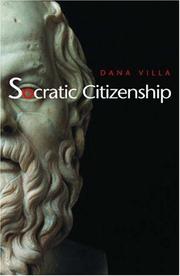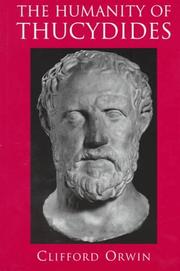| Listing 1 - 4 of 4 |
Sort by
|

ISBN: 361500180X 9783615001808 Year: 1996 Publisher: Hildesheim Weidmann
Abstract | Keywords | Export | Availability | Bookmark
 Loading...
Loading...Choose an application
- Reference Manager
- EndNote
- RefWorks (Direct export to RefWorks)
Historians --- Biography. --- -Historiographers --- Scholars --- Biography --- Grote, George --- -Grote, George --- -Anniversaries, etc --- Views on Greek civilization --- Greece --- Historiography. --- -Biography --- Grote, George, --- Beauchamp, Philip --- Anniversaries, etc. --- Historians - Great Britain - Biography.
Book
ISBN: 9004280499 Year: 2014 Publisher: Leiden, Netherlands : Brill,
Abstract | Keywords | Export | Availability | Bookmark
 Loading...
Loading...Choose an application
- Reference Manager
- EndNote
- RefWorks (Direct export to RefWorks)
George Grote’s (1794-1871) extensive publications on ancient Greek history and philosophy remain landmarks in the history of classical scholarship. Since the late 20thcentury, lively interest in the works of Grote has seen his profile revived and his ongoing significance highlighted: he has taken up his rightful place among the most celebrated nineteenth-century classical intellectuals. Grote’s critical engagement with Greek historiography and philosophy revolutionized classical studies in his day – a revolution set against both long-established interpretations and prevailing trends in German Altertumswissenschaft. Twenty-first-century scholarship shows that Grote’s works remain lively, sparkling and relevant, as they offers valuable insights that cut across the intellectual borders of the Victorian age. His diligent scholarship, fascination with evidence and sound judgement, intertwined with intriguing and insightful narrative prose, continue to captivate the attention of modern readers. In Brill’s Companion to George Grote and the Classical Tradition Kyriakos N. Demetriou leads a team of prominent scholars to contextualize, unravel and explore Grote’s works as well as provide a critical assessment of his posthumous legacy.
Civilization, Classical --- Classicists --- Platonists --- Historians --- Historiography. --- Grote, George, --- Criticism and interpretation. --- Influence. --- Greece --- Civilization

ISBN: 0691086923 Year: 2001 Publisher: Oxford : Princeton University Press,
Abstract | Keywords | Export | Availability | Bookmark
 Loading...
Loading...Choose an application
- Reference Manager
- EndNote
- RefWorks (Direct export to RefWorks)
Many critics bemoan the lack of civic engagement in America. Tocqueville's ''nation of joiners'' seems to have become a nation of alienated individuals, disinclined to fulfill the obligations of citizenship or the responsibilities of self-government. In response, the critics urge community involvement and renewed education in the civic virtues. But what kind of civic engagement do we want, and what sort of citizenship should we encourage? In Socratic Citizenship, Dana Villa takes issue with those who would reduce citizenship to community involvement or to political participation for its own sake. He argues that we need to place more value on a form of conscientious, moderately alienated citizenship invented by Socrates, one that is critical in orientation and dissident in practice. Taking Plato's Apology of Socrates as his starting point, Villa argues that Socrates was the first to show, in his words and deeds, how moral and intellectual integrity can go hand in hand, and how they can constitute importantly civic--and not just philosophical or moral--virtues. More specifically, Socrates urged that good citizens should value this sort of integrity more highly than such apparent virtues as patriotism, political participation, piety, and unwavering obedience to the law. Yet Socrates' radical redefinition of citizenship has had relatively little influence on Western political thought. Villa considers how the Socratic idea of the thinking citizen is treated by five of the most influential political thinkers of the past two centuries--John Stuart Mill, Friedrich Nietzsche, Max Weber, Hannah Arendt, and Leo Strauss. In doing so, he not only deepens our understanding of these thinkers' work and of modern ideas of citizenship, he also shows how the fragile Socratic idea of citizenship has been lost through a persistent devaluation of independent thought and action in public life. Engaging current debates among political and social theorists, this insightful book shows how we must reconceive the idea of good citizenship if we are to begin to address the shaky fundamentals of civic culture in America today.
Política --- Ciudadanía. --- Filosofía. --- Sócrates, --- Pensamiento político y social. --- Alcibiades. --- Berlin, Isaiah. --- Callicles. --- Enlightenment. --- Euben, Peter. --- Goldman, Harvey. --- Good Life. --- Grote, George. --- Habermas, Jürgen. --- Hegel, Georg. --- Heidegger, Martin. --- Kant, Immanual. --- Kraut, Richard. --- Machtstaat. --- Melian Dialogue. --- Reformation. --- Renaissance science. --- Socratic method. --- agonistic politics. --- bad conscience. --- conformism. --- disillusion. --- diversity of opinion. --- morality of mores. --- namos. --- natural right argument. --- nihilism phenomenon. --- open discussion model (Mill). --- philosopher-kings. --- philosophical alienation. --- plural voting scheme. --- slave morality.

ISBN: 0691034494 0691219400 9780691034492 Year: 1994 Publisher: Princeton (N.J.): Princeton university press
Abstract | Keywords | Export | Availability | Bookmark
 Loading...
Loading...Choose an application
- Reference Manager
- EndNote
- RefWorks (Direct export to RefWorks)
Thucydides has long been celebrated for the unflinching realism of his presentation of political life. And yet, as some scholars have asserted, his work also displays a profound humanity. In the first thorough exploration of the relation between these two traits, Clifford Orwin argues that Thucydides' humanity is not a reflection of the author's temperament but an aspect of his thought, above all of his articulation of the central problem of political life, the tension between right and compulsion. This book provides the most complete treatment to date of Thucydides' handling of the problem of injustice, as well as the most extensive interpretations yet of the speeches in which it comes to light. Thucydides does not merely display the weakness of justice in the world, but joins his characters in exploring the implications of this weakness for our understanding of what justice is. Orwin pursues this question through Thucydides' work and relates it to the historian's other leading concerns, such as the contrast between the Athenian way and the Spartan way, the role of piety in political life, the interaction of foreign and domestic politics, and the role of statesmanship in a world dominated by frenzies of hope, fear, and indignation. Above all, Orwin demonstrates the richness, complexity, and daring of Thucydides' articulation of these issues.
Human behavior --- Thucydides --- Greece --- History --- Historiography --- Action, Human --- Behavior, Human --- Ethology --- Human action --- Human beings --- Human biology --- Physical anthropology --- Psychology --- Social sciences --- Psychology, Comparative --- Behavior --- Fukidid --- Tucídides --- Thukydides --- Thoukydidēs --- Tucidide --- תוקידידיס --- Θουκυδίδης --- -Human behavior --- Thucydide --- Thoukudides --- Thucydides. --- Historiography. --- Human behavior. --- Aeolians. --- Alcibiades. --- Attica. --- Boeotia, Boeotians. --- Brasidas. --- Cleon. --- Cogan, Marc. --- Corinth, Corinthians. --- Delphic Oracle. --- Diodotus. --- Dorian Greeks. --- Edmunds, Lowell. --- Epidamnus. --- Farrar, Cynthia. --- Forde, Steven. --- Gomme, A. W. --- Grote, George. --- Heath, Malcolm. --- Hermocrates. --- Herodotus. --- Kagan, Donald. --- Lincoln, Abraham. --- Macleod, Colin. --- Melos, Melians. --- Nicias. --- Nietzsche, Friedrich. --- Ostwald, Martin. --- Pearson, Lionel. --- Peisander. --- Pericles. --- Poteidaea. --- Romilly, Jacqueline de. --- Sicilian expedition. --- Sthenelaidas. --- Thrace, Thracians. --- Trojan War. --- Walzer, Michael. --- Xenophanes. --- Tucídides, --- Crítica e interpretación. --- Thucydides - History of the Peloponnesian War --- Greece - History - Peloponnesian War, 431-404 B.C. - Historiography
| Listing 1 - 4 of 4 |
Sort by
|

 Search
Search Feedback
Feedback About UniCat
About UniCat  Help
Help News
News